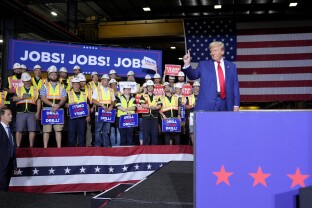The Trump campaign’s attacks on Democrats’ clean energy agenda have zeroed in on a problem that even those in the Biden administration admit needs fixing: The nation’s infrastructure is lagging behind the investment in renewable energy.
Surrounded by people dressed in yellow vests and hard hats at a steel facility in Potterville, Michigan, Donald Trump criticized the Biden administration’s energy policy, calling it “a war on American energy.” A closely watched, tight House race is underway in Potterville to replace Democratic Rep. Elissa Slotkin, who is running for Michigan’s open Senate seat.
“Most Americans are unaware that Harris and Biden have been shutting down entire swaths of our energy and electricity infrastructure without replacing it or even talking about it, leading to spiking electrical prices and energy prices and also an energy shortfall like we’ve never had before,” Trump said.
The Biden administration has not shut down “swaths of energy or electricity infrastructure,” but as fossil fuel power plants close, and demand for electricity reaches new heights, the nation’s electrical grid is increasingly under serious strain. The price for on-demand, reliable electricity (called capacity) is slated to increase, with some of that cost being passed to consumers.
As NOTUS previously reported, in the D.C. area, capacity prices could go up by as much as 1,200% for next year in the nation’s largest grid market. Forecasters anticipate that those prices will remain high and even increase further the following year.
Biden climate adviser John Podesta urged further investment in building transmission infrastructure and expanding renewable energy sources when asked about the reliability concerns last month. Renewable energy lobbyists say the same, arguing that wind, solar and batteries could fill much of the energy gap with planning and policy reforms to loosen the bottlenecks currently slowing development. Sen. Joe Manchin is leading the push for a permitting reform bill to address some of those problems, and his proposal has garnered unusual bipartisan support and cheers from the energy community.
Trump has historically been very skeptical of renewable energy sources and has repeatedly platformed conspiracy theories about clean energy solutions, including calling climate change a “hoax.” While it’s unlikely his administration can completely halt the transition away from fossil fuels, it certainly can reverse many Biden administration policies.
Notably, however, at this campaign stop, Trump didn’t mention climate change at all, instead focusing more on immediate energy costs.
“My goal will be to cut your energy costs in half within 12 months of taking office,” Trump said, even promising to declare a national emergency to increase electricity generation supplies.
In a call with reporters before the speech, Trump’s former interior secretary, David Bernhardt, called for an aggressive investment in coal and gas.
The Harris campaign has rarely mentioned energy or climate change on the campaign trail, but Kamala Harris did reverse her 2019 position on banning fracking. Her team, allied outside Democratic groups and the Biden administration continue to tout the Inflation Reduction Act for spurring increased manufacturing investment and creating jobs.
“Donald Trump wants to sell out America’s energy future to Big Oil executives and the Chinese Communist Party, Vice President Kamala Harris disagrees,” James Singer, a spokesperson for the Harris campaign, said to NOTUS. “Right now, American energy of all kinds has hit record production levels, resulting in hundreds of thousands of new jobs for American workers because of her leadership. Trump’s proposals would raise prices on consumers, pollute our air and water and take us backwards.”
So far, data on the Inflation Reduction Act shows the Biden administration’s climate policies led to hundreds of billions of dollars of private and consumer investment over the last two years, leading to manufacturing commitments across the country at a scale not seen for decades. Clean energy job growth also increased at a pace of about double the average job growth for the rest of the economy last year.
When asked by NOTUS about those manufacturing successes, Bernhardt did not acknowledge their existence. “Where exactly are you seeing that progress?” he asked, arguing that Trump’s deregulatory agenda would help manufacturing far more.
Bernhardt and Isaac Orr, a conservative energy policy expert, both argued that the reliability concerns, the IRA and Democratic climate policies would lead to a decline in American manufacturing, likening U.S. climate policies to European ones.
The campaign would not specify whether Trump planned to push for a repeal of the IRA in full or in part. Earlier this month, 18 House Republicans who voted against the legislation began to push to preserve at least some of the bill’s manufacturing incentives, which have brought industrial development in their districts.
—
Anna Kramer is a reporter at NOTUS.
Sign in
Log into your free account with your email. Don’t have one?
Check your email for a one-time code.
We sent a 4-digit code to . Enter the pin to confirm your account.
New code will be available in 1:00
Let’s try this again.
We encountered an error with the passcode sent to . Please reenter your email.


